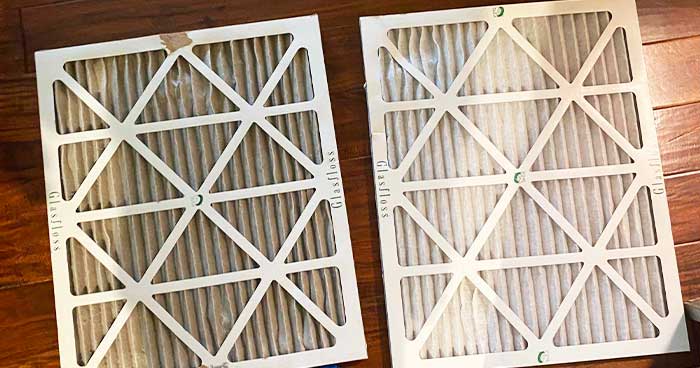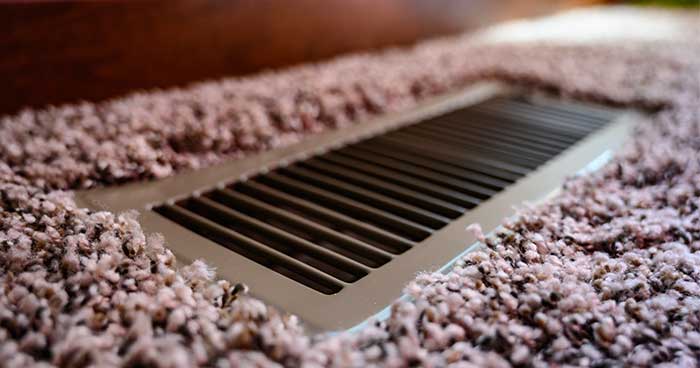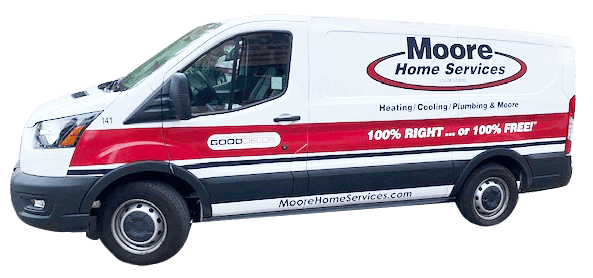Why Does an Air Conditioner Cause a Sore Throat?
Posted by Moore Home Services
HVAC Basics
Sore throats and summers don’t mix. The summer is when we want to be free from any illness and embrace the potential of the season. While it may not be an issue for some, for others, the air conditioner can cause a sore throat.
Unfortunately, there are several ways an air conditioner can cause a sore throat. Here are the issues we see the most.
Bad AC Installation
Location matters. Not just in where you choose your home, but where your HVAC system is installed. There can negative consequences of
installing your HVAC system in a bad location.
Sometimes, an unaware installer will place an HVAC system in a part of the attic without air flow. Just like everything else, your HVAC system needs to breathe. Without proper air flow, dust and debris can settle, then get into the treated air.

Too much moisture can also be an issue. When a furnace is installed in a place that’s close to a water line, or in an area with a concentration of humidity or water, it can foster mold growth. Mold growth means mold spores can get into your HVAC system and eventually your air.
Cracked or Broken Ductwork
All air from a central heating and cooling system travels through a series of flexible metal tubes called ducts, or ductwork. These metal tubes are responsible for bringing air to and from the HVAC system and evenly distributing air throughout your home.
Over time and with use, all ducts will experience small cracks and holes. Though these holes are small, they can still let in dust and other air contaminates.
When you have central heating and cooling, all air that circulates through your home runs on a constant loop. At the start of a cooling cycle, the HVAC system pulls in ambient air from your home. It then temperature treats that air and sends it back. This loop basically goes forever.
Since the air stays on a loop, routine cleaning and maintenance are crucial to overall health and wellness. However, we see far too many Santa Rosa homeowners only call us when something goes wrong.

A dirty air filter may be the biggest culprit of an air conditioner induced sore throat. The air filter plays two very important roles. Both of which keep you, and you HVAC system, safe.
First, an air filter traps dust and debris that could clog major components of your HVAC system. And second, the air filter pulls dust, dander, allergens, and even mold spore out your indoor air.
When the air filter is too full and dirty, it can’t preform properly. This forces your HVAC system to work twice as hard to create the same amount of treated air. And it means that no air is getting filtered.
At Moore Home Services, we recommend changing the air filter twice per year. Once in the spring and once in the fall. You should also check it after a fire. Remnants from the fire can get trapped in your air filter.
Closed Vent Control
Far too often we see homeowners running their central air system
with closed vents and no windows open. While it is true that opening a window while running your system isn’t the most resourceful idea, there needs to be a time when fresh air is allowed in the house.

Since all the temperature treated air in your home is recycled, without some fresh air, it can get stale. Even though it goes through the air filter, breathing in
too much stale air can lead to headaches, a sore throat, and even cause fatigue.
To keep your air from getting stale, it’s best to open a window from time to time or keep the vents in your attic open.
Fresh air has great benefits for overall health. It can clear your lungs, help give you energy, lower blood pressure, and even improve digestion.
What You Can do to Combat an AC Induced Sore Throat
There are a few things you can do if you believe your air conditioner is the cause for a sore throat. Here are some effective ways to get around this:
- Schedule Regular Tune-Ups: It’s recommended that you should get two tune-ups per year. Once in the spring before AC season and once in the fall before furnace season.
- Routinely Check the Air Filter: During a routine tune-up, the HVAC tech should check your air filter and replace it if necessary. It’s also important to check your air filter after a fire or if there’s been construction in the area.
- Keep Yourself Hydrated: It’s not a well-known fact that central air systems remove moisture from the air. It’s important to keep yourself hydrated both inside and outside the house.
- Frequently Dust and Vacuum: Some home environments are dustier than others. It happens. It’s best for anyone and everyone to dust and vacuum their home once per week.
When the Air Conditioner Isn’t to Blame
There are many other reasons why you may get a sore throat during the summer. Seasonal allergies, environmental factors, and things like construction can make a difference in your
overall health and wellness.
When your home feels too dry, we recommend investing in a humidifier. And as always, drink more water.
 Too much moisture can also be an issue. When a furnace is installed in a place that’s close to a water line, or in an area with a concentration of humidity or water, it can foster mold growth. Mold growth means mold spores can get into your HVAC system and eventually your air.
Too much moisture can also be an issue. When a furnace is installed in a place that’s close to a water line, or in an area with a concentration of humidity or water, it can foster mold growth. Mold growth means mold spores can get into your HVAC system and eventually your air.
 A dirty air filter may be the biggest culprit of an air conditioner induced sore throat. The air filter plays two very important roles. Both of which keep you, and you HVAC system, safe.
First, an air filter traps dust and debris that could clog major components of your HVAC system. And second, the air filter pulls dust, dander, allergens, and even mold spore out your indoor air.
When the air filter is too full and dirty, it can’t preform properly. This forces your HVAC system to work twice as hard to create the same amount of treated air. And it means that no air is getting filtered.
At Moore Home Services, we recommend changing the air filter twice per year. Once in the spring and once in the fall. You should also check it after a fire. Remnants from the fire can get trapped in your air filter.
A dirty air filter may be the biggest culprit of an air conditioner induced sore throat. The air filter plays two very important roles. Both of which keep you, and you HVAC system, safe.
First, an air filter traps dust and debris that could clog major components of your HVAC system. And second, the air filter pulls dust, dander, allergens, and even mold spore out your indoor air.
When the air filter is too full and dirty, it can’t preform properly. This forces your HVAC system to work twice as hard to create the same amount of treated air. And it means that no air is getting filtered.
At Moore Home Services, we recommend changing the air filter twice per year. Once in the spring and once in the fall. You should also check it after a fire. Remnants from the fire can get trapped in your air filter.
 Since all the temperature treated air in your home is recycled, without some fresh air, it can get stale. Even though it goes through the air filter, breathing in too much stale air can lead to headaches, a sore throat, and even cause fatigue.
To keep your air from getting stale, it’s best to open a window from time to time or keep the vents in your attic open. Fresh air has great benefits for overall health. It can clear your lungs, help give you energy, lower blood pressure, and even improve digestion.
Since all the temperature treated air in your home is recycled, without some fresh air, it can get stale. Even though it goes through the air filter, breathing in too much stale air can lead to headaches, a sore throat, and even cause fatigue.
To keep your air from getting stale, it’s best to open a window from time to time or keep the vents in your attic open. Fresh air has great benefits for overall health. It can clear your lungs, help give you energy, lower blood pressure, and even improve digestion.

